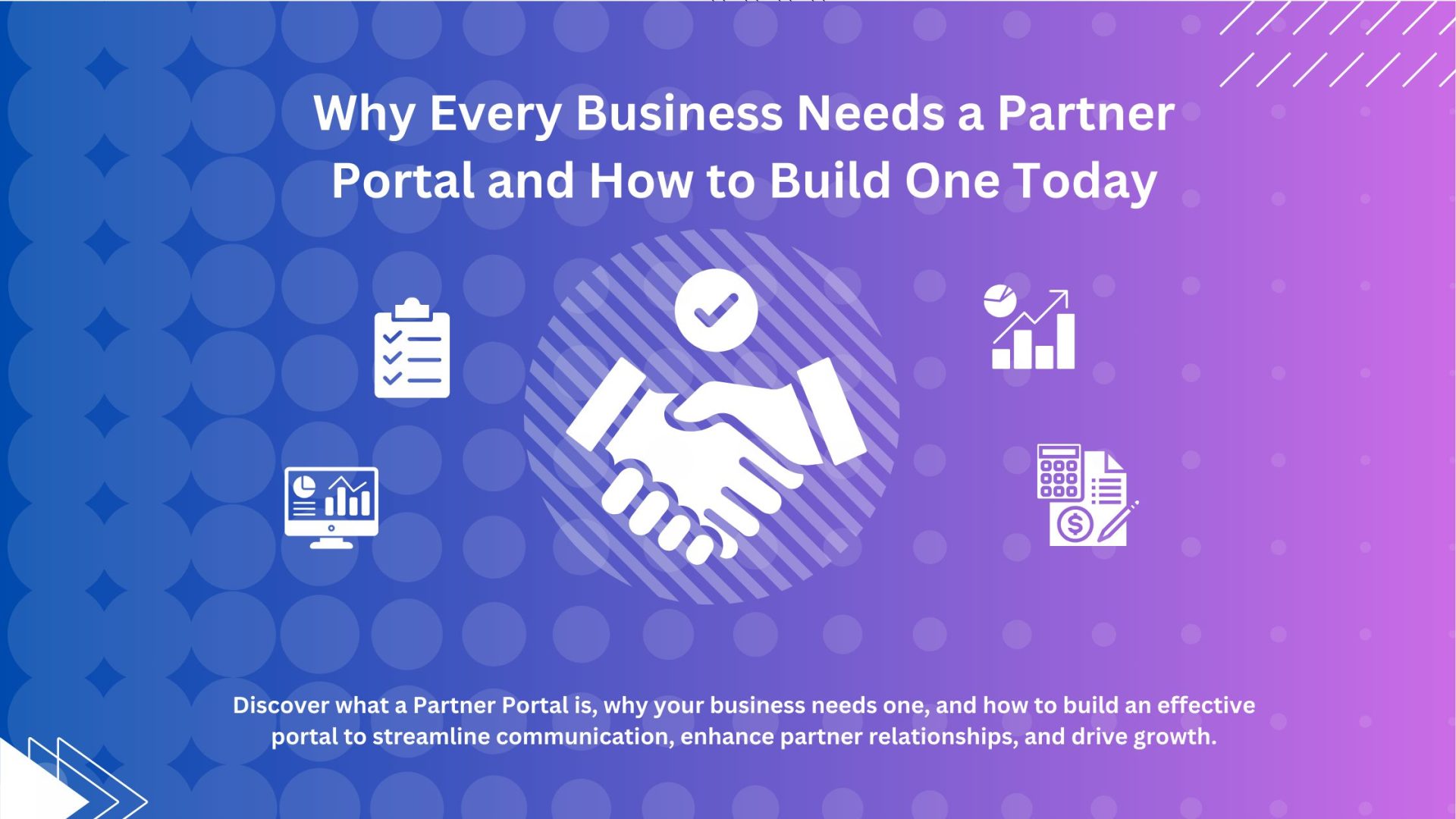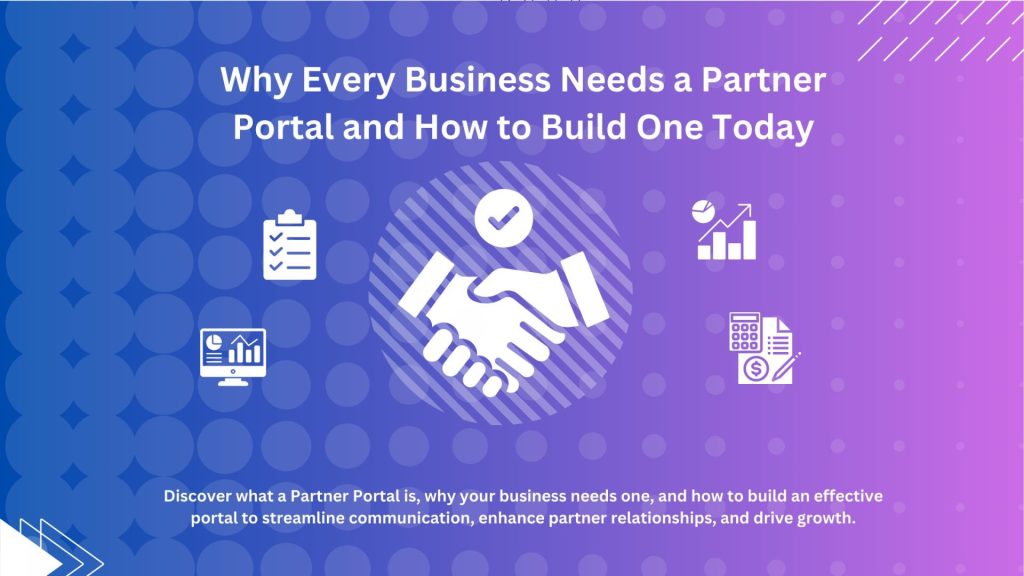In today’s fast-paced digital landscape, businesses are constantly looking for ways to enhance collaboration, streamline processes, and increase efficiency. Whether you’re working with vendors, resellers, distributors, or other partners, providing a seamless way to interact and exchange information can significantly impact your business’s growth. This is where a Partner Portal comes into play.
In this blog post, we’ll dive deep into what a Partner Portal is, its benefits. And why your business needs Partner Portal Solution. We’ll also explore how you can build a successful Partner Portal for your organization.
What is a Partner Portal?
A Partner Portal is a secure, web-based platform that enables businesses to share resources, tools, and information with their external partners, such as distributors, resellers, suppliers, or affiliates. It serves as a centralized hub for collaboration, communication, and data exchange between the company and its partner ecosystem.
Think of it as a virtual “gateway” where your partners can access everything they need to work with you effectively—be it sales collateral, product information, training materials, marketing resources, performance reports, or order tracking systems.
Key Features of a Partner Portal
- Centralized Access to Resources: Partners can easily access necessary documents, training materials, product catalogs, and promotional resources in one place.
- Collaboration Tools: Features like chat, forums, and shared calendars help facilitate communication between partners and internal teams.
- Sales Enablement Tools: With tools like lead management, pricing updates, and customized dashboards, a Partner Portal helps streamline the sales process.
- Reporting & Analytics: Partners can monitor their performance through real-time dashboards, tracking sales progress, KPIs, and commissions.
- Security & Control: With role-based access controls, companies can ensure that sensitive information is only accessible to authorized users.
Why Do Businesses Need a Partner Portal?
The benefits of a Partner Portal are clear. But let’s break down why your business specifically needs one.
1. Improved Partner Relationships and Engagement
Managing relationships with partners can be complex. Whether they’re resellers, suppliers, or affiliates, ensuring that they have easy access to the information and tools they need to succeed is crucial. A Partner Portal fosters stronger relationships by offering:
- Instant access to resources.
- Efficient communication through collaboration tools.
- 24/7 availability, reducing wait times for support or information.
When partners are equipped with the right tools, they become more engaged and productive, which ultimately strengthens your business relationships.
2. Streamlined Communication
Communication breakdowns between businesses and their partners can slow down growth, cause delays, and increase the risk of errors. Partner Portals centralize communication, making it easier to share updates, news, and promotions. This ensures that everyone is on the same page, reducing misunderstandings and improving overall coordination.
3. Efficiency and Time Savings
A Partner Portal can dramatically reduce the time spent on administrative tasks like emailing documents, chasing updates, or manually processing orders. By automating processes and providing partners with self-service access to key information, businesses can significantly cut down on time-consuming activities. As a result, both your internal teams and your partners can focus on more strategic tasks that drive growth.
4. Enhanced Partner Onboarding and Training
Training new partners can be a time-consuming and resource-draining task. A Partner Portal offers an on-demand training center where new partners can access materials at their convenience. This eliminates the need for repetitive training sessions and allows for a faster onboarding process. Additionally, regular updates and new resources can be pushed to the portal, ensuring that partners stay up-to-date with the latest product developments, features, and sales techniques.
5. Access to Data and Analytics
One of the key reasons why businesses need a Partner Portal is the ability to track performance and gain valuable insights into partner activity. A well-designed portal allows you to gather data about sales, leads, and product usage, providing actionable insights. You can track metrics such as:
- Partner sales performance.
- Lead conversion rates.
- Commissions and bonuses earned.
- Overall business growth by channel.
This data helps businesses optimize their partner programs, identify high-performing partners, and make data-driven decisions to improve efficiency.
6. Scalability
As your business grows, so does your partner network. Managing a growing partner ecosystem without a centralized system can quickly become overwhelming. A Partner Portal scales with your business, enabling you to efficiently manage a large number of partners without sacrificing quality or service.
With built-in automation features, the portal can handle an increased volume of partners, products, and data, making it easier to maintain consistent processes and service levels.
7. Improved Brand Consistency
Consistency in brand messaging and product information is crucial, especially when working with multiple partners. A Partner Portal ensures that your partners always have access to the latest marketing materials, product details, and promotional content. This helps maintain a consistent brand image across all channels, which is key to building trust with customers and partners alike.
8. Increased Partner Performance and Revenue
A Partner Portal directly contributes to improved sales and partner performance. By providing your partners with tools that help them close deals faster, manage leads more efficiently, and track their performance, your business can achieve higher revenue growth through its partner network. Partner incentives like commissions and performance bonuses can also be managed and tracked within the portal, motivating partners to perform at their best.
How to Build a Successful Partner Portal
Now that you understand why your business needs a Partner Portal, let’s explore how to build one that meets the needs of both your business and your partners.
Step 1: Define Your Goals and Objectives
Before developing a portal, it’s essential to outline your goals. Are you trying to streamline communication? Simplify the onboarding process? Improve sales performance? Defining clear objectives will guide the design and features of the portal.
Step 2: Choose the Right Platform and Tools
There are many platforms available to build a Partner Portal, from customizable software to SaaS-based solutions. Choose a platform that integrates seamlessly with your existing CRM, ERP, or other business tools, and offers the features that align with your business needs.
Step 3: Design a User-Friendly Interface
The usability of the portal is crucial. Partners should be able to navigate the platform with ease, whether they are accessing resources, viewing performance reports, or submitting orders. A clean, intuitive design is key to ensuring partners can find the information they need quickly and efficiently.
Step 4: Integrate Automation and Analytics
To maximize the effectiveness of your portal, integrate automation tools like lead management systems, automated order processing, and performance tracking. Also, include analytics dashboards that provide partners with real-time insights into their performance.
Step 5: Provide Continuous Support and Training
Once your Partner Portal is live, ensure your partners have the support they need to get the most out of it. Offer training resources, dedicated support teams, and regular updates to keep your partners engaged and informed.
Step 6: Monitor and Improve
A successful Partner Portal requires ongoing optimization. Monitor how partners are using the platform, gather feedback, and make improvements based on their needs. This iterative process ensures that the portal evolves to meet changing business requirements and partner expectations.
Conclusion: Why Your Business Needs a Partner Portal
A Partner Portal is no longer a luxury—it’s a necessity for businesses that rely on external partners to drive growth. It streamlines communication, enhances partner relationships, and provides valuable data insights to optimize your partner ecosystem. By offering a centralized hub for your partners, you’re not just making their lives easier; you’re also positioning your business for greater success.
If you want to stay competitive and scale efficiently, building a Partner Portal should be at the top of your business priorities. With the right tools, design, and continuous improvement, your business can reap the rewards of a strong, engaged partner network.

